June 21, 2025 | 03:14 GMT +7
June 21, 2025 | 03:14 GMT +7
Hotline: 0913.378.918
June 21, 2025 | 03:14 GMT +7
Hotline: 0913.378.918
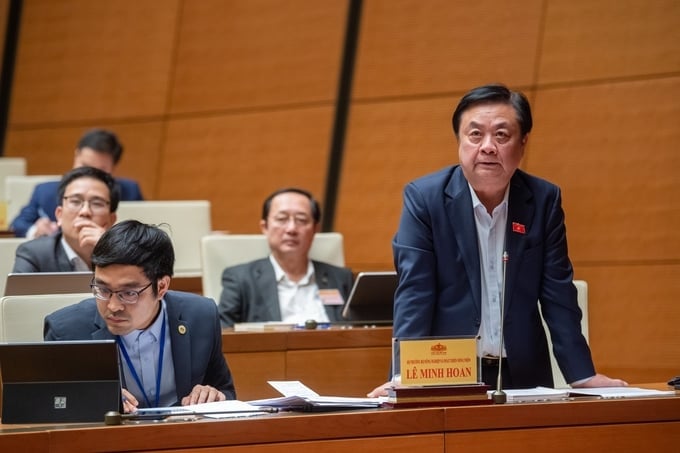
Minister Le Minh Hoan responding to the National Assembly's questioning on the afternoon of November 6. Photo: National Assembly.
During the economic sector's questioning session, Representative Ho Thi Kim Ngan from the Bac Kan Provincial Delegation to the National Assembly stated that several areas have delegated forest protection responsibilities to local communities in 2021. Accordingly, households in communes in zone 2 and zone 3, including Bac Kan province, will assume the responsibility of local forest protection. However, to date, the forest protection labor in 2021 has not been fully paid. The amount owed to Bac Kan province currently exceeds 28 billion Vietnamese dong. Representative Ho Thi Kim Ngan requested the Minister of the Ministry of Agriculture and Rural Development to clarify the reasons for the delayed disbursement and the timeline for the local forested residents, such as those in Bac Kan province, to receive remuneration for their forest care and protection efforts.
According to Minister Le Minh Hoan, with the aim of closing natural forests, the Government has issued support policies for forest delegations and the balancing budgets against practical needs. Vietnam currently applies a standard rate of 300,000 to 400,000 Vietnamese dong per hectare. Throughout multiple meeting sessions, participants have voiced their concerns regarding the low rate.
In compliance with the Prime Minister's guidance, the Ministry of Agriculture and Rural Development is in the process of amending the Law on Forestry by drafting a Decree to raise the standard rate to 400,000 to 600,000 Vietnamese dong per hectare. "The Ministry of Agriculture and Rural Development believes that the appropriate rate should fall between 1.1 and 1.3 million Vietnamese dong per hectare. However, we must first balance from the shared resources," Minister Hoan added.
Additionally, the Ministry of Agriculture and Rural Development is preparing to submit to the Prime Minister a plan to enhance the multifunctional ecological value of forests with a focus on generating additional employment opportunities and improving livelihoods under the forest canopy, in addition to forest protection efforts.
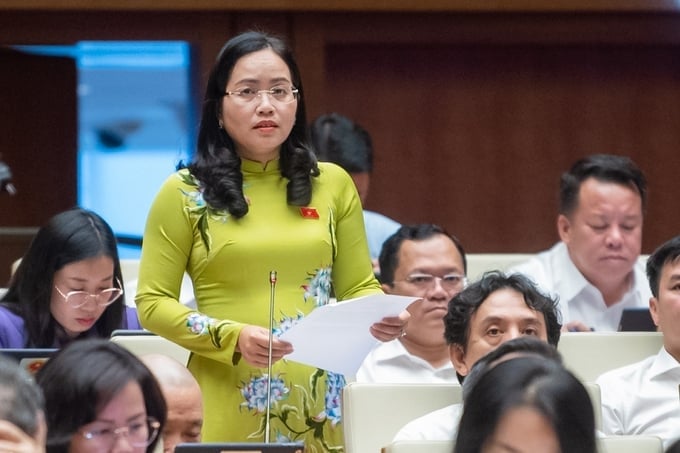
Representative Ho Thi Kim Ngan requested further information regarding the delegation of forest protection activities. Photo: National Assembly.
The issue of outstanding payments for forest protection delegation in Bac Kan province and several related provinces, according to Minister Le Minh Hoan, is connected to the sustainable agricultural development program led by the Ministry of Agriculture and Rural Development.
After the decision to establish the National Target Program for New Rural Development, the central government will continue to allocat budgets to regions 1, 2, and 3 until 2020. With the establishment of the National Target Program for Ethnic Minorities and Mountainous Areas, as directed by the government, regions 2 and 3 have been categorized under the National Target Program for Ethnic Minority and Mountainous Area Development. However, coordination activities are incomplete due to the delayed commencement.
Sharing a similar concern, Representative Nguyen Lam Thanh from the Thai Nguyen Provincial Delegation to the National Assembly debated the issue of forest protection delegation. According to Mr. Thanh, there are three inconsistencies surrounding this matter.
Firstly, the outstanding debt for forest protection poses a challenge. Accordingly, the issue of late disbursement is not exclusive to Bac Kan province. The debts regarding community's forest protection labor need to be promptly resolved, including the reallocation of resources to accomplish the task.
Secondly, Representative Nguyen Lam Thanh proposed a review of the forest protection activities. According to Resolution No. 100 on the 5-million-hectare forest program, funds for forest protection were recognized as developmental capital, and regularly disbursed annually. However, Vietnam currently categorizes this funding under the national target program and the ethnic program. As a result, local governments must undergo numerous procedures and formalities to receive payments.
Thirdly, the standard rates also pose a challenge to forest protection efforts. Conclusion No. 65 by the Politburo implementing Resolution 24 on ethnic affairs highlights the necessity for policies to support people inhabiting as well as protecting forests. On the other hand, management agencies should innovate forest protection activities, revise forest standards, and delegate forest protection to stabilize people's livelihoods. However, amendments to Decree No. 75 are stagnated, leading to an inconsistent funding source; i.e: fundings for forest protection activities have been drawn from various sources including environmental protection delegation fees, the national target program, and external administrative financial resources.
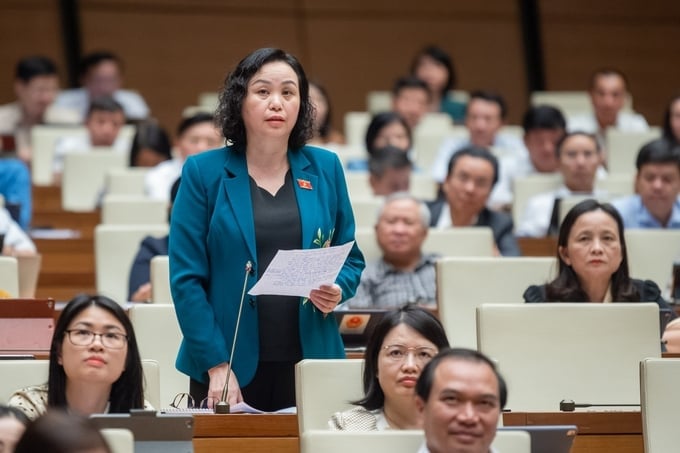
Representative Cao Thi Xuan from the Thanh Hoa Provincial Delegation to the National Assembly voicing concerns regarding resettlement. Photo: National Assembly.
In response to the identified challenges, Representative Nguyen Lam Thanh emphasized the need to establish a dedicated funding source and elevate the prescribed standards for delegation. Furthermore, it is important to address a rising and fundamental issue: citizens are required to undergo an additional process of re-leasing or re-delegating from national parks, conservation areas, and forestry organizations. These unnecessary procedures significantly limit the direct allocation of standard rates to local residents.
Minister Le Minh Hoan expounded that during the formulation of a proposal to increase forest protection delegation rates, the Ministry has advocated for a rate between 1.1 and 1.3 million Vietnamese dong per hectare, based on standard pricing. However, due to resource constraints, the figures were limited within the range of 400 to 600 thousand Vietnamese dong.
In addition to the allocated funds for forest protection activities, Minister Le Minh Hoan stressed the need to establish means of livelihood under the forest canopy, offering greater employment opportunities to communities involved in forest protection, forest management authorities, and forest ranger forces. The Ministry of Agriculture and Rural Development is preparing to submit comprehensive amendments to the Resolution on forestry and investments in the forestry sector, with an emphasis on the development of medicinal plants, forest-based tourism, forest carbon credits, payment for forest environmental services, among other initiatives.
"We need a comprehensive approach to generate additional employment opportunities and livelihoods to compensate for the dedication in forest protection, thereby enabling a comprehensive holistic implementation of forest protection," affirmed the Minister.

Minister Le Minh Hoan pledges firm actions to safeguard the rights and interests of the people. Photo: National Assembly.
Representative Cao Thi Xuan from the Thanh Hoa Provincial Delegation to the National Assembly stated that the Prime Minister's Decision No. 590 sets out goals for the establish stable provisions for 47,159 households in disaster-prone areas from 2021 to 2025. However, between 2021 and 2022, stable provisions were only arranged for over 5,000 households. In comparison to the Prime Minister's target by 2025, Vietnam needs to secure additional stable provisions for 42,000 households in disaster-prone areas. This is an exceedingly challenging task, given the current slow implementation status.
Minister Le Minh Hoan stated that the overall progress in resettlement tasks overseen by the Ministry of Agriculture and Rural Development requires close cooperation between the central and local governments. Despite the approved the local resettlement projects, land funds are insufficient for various reasons, thereby necessitating reassignment and relocation. Additionally, resettlement projects are typically attached with conditions regarding residents' production land, posing considerable practical difficulty and hindering the progress of population relocation.
"In certain cases, resettlement projects have successfully relocated the populace, albeit to limited effectiveness. Due to inadequate livelihoods and incongruence with their customs, people often return to their former living arrangements. The Ministry is currently reassessing and consulting with local governments in submitting proposals to the central government, to ensure that resettlement areas will also also cultivate a sustainable development community," Minister Hoan added.
With regards to the residents' livelihood, Representative Mai Van Hai from the Thanh Hoa Provincial Delegation to the National Assembly urged the Minister of Agriculture and Rural Development to clarify on the issue of new rural construction. Despite the continuously improveing material and spiritual life of residents, and the increasingly vibrant rural landscape; the implementation of certain new rural criteria still faces numerous difficulties, obstacles, and inconsistencies. Namely, several delegates have directed their concerns towards the regulations on the usage of centralized clean water for households in remote mountainous areas, citing them as challenging and impractical.
In response, Minister Le Minh Hoan affirmed that the Ministry of Agriculture and Rural Development had organized local field survey teams. Consequently, they will consider adjusting several criteria regarding new rural construction to ensure flexibility, with a focus on increased openness and flexibility for local government levels in establishing and appraising the new rural criteria.
"The Ministry of Agriculture and Rural Development will engage in dialogues with all local governments on the western side of the Truong Son range regarding new rural criteria specific to geographical conditions," the Minister emphasized.
Regarding the criteria for new rural construction, Representative Nguyen Thi Thu Thuy from the Binh Dinh Provincial Delegation to the National Assembly expressed concern regarding the criteria for forest protection funding and the criteria for implementing the national target program on the socio-economic development of ethnic minority areas.
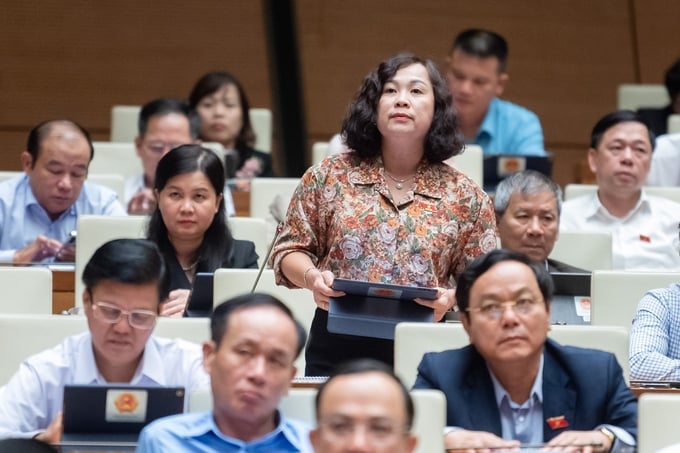
Representative Nguyen Thi Thu Thuy from the Binh Dinh Provincial Delegation to the National Assembly raised concerns regarding the transitional process during new rural construction. Photo: National Assembly.
During the course of implementation, many mountainous communes have attained the new rural standard. However, due to the geographical characteristics and the life of ethnic minority communities, the achieved criteria have not been sustainable. Residents from households which recently escaped poverty face a high risk of falling back into poverty. The issue lies in the existing regulations where communes meeting new rural standards are no longer eligible for associated social security policies. The representative inquired for the Minister's perspective on the necessity of extending the duration of social security policies entitlement, and gradually reducing the policies' benefits for mountainous, remote, and ethnic minority communes meeting new rural standards.
Minister Le Minh Hoan addressed this issue, acknowledging that when communes reach new rural standards, financial support from both the central and local budgets will be utilized to fulfill the new rural criteria. Upon completion of the task, the support policies will be withdrawn.
"The rush to meet the new rural standard creates a conflicting mentality: whereas certain local governments wish for more communes to meet the new rural standards and fulfill the target, others are hesitant to achieve said standards," he stated.
With the aim of addressing the issue comprehensively, Minister Le Minh Hoan highlighted plans to discuss with the Steering Committee of the National Target Program to offer essential policies outside the National Target Program to challenged communes after achieving the new rural criteria. These policies aim to foster development without instilling reliance on the government, enhancing the community's capacities, and establishing diverse models for the community to overcome difficulties and achieve sustainable development.
During the directive statement in the economic sector inquiry, National Assembly Chairman Vuong Dinh Hue stated that the economic sector falls under the responsibility of the Minister of Industry and Trade, the Minister of Natural Resources and Environment, the Minister of Agriculture and Rural Development, the Minister of Transport, the Minister of Construction; and Deputy Prime Minister Tran Hong Ha.
Chairman Vuong Dinh Hue concluded that on the afternoon of November 6, 88 delegates had registered for inquiries. Given the large number of inquiries, he requested the delegates to exercise consideration, selecting crucial issues and only engaging in debates when necessary, to allow other National Assembly delegates to participate in the session.
Translated by Nguyen Hai Long
![Turning wind and rain into action: [10] Advancing accessible climate services for farmers](https://t.ex-cdn.com/nongnghiepmoitruong.vn/608w/files/linhnhp/2025/06/20/1911-z6704423696987_15fd32ffc26d590d204d520c9dac6786-nongnghiep-161854.jpg)
(VAN) Not only does it help farmers 'avoid droughts and rains,' the development of agricultural climate services also enhances their ability to proactively adapt to a rapidly changing climate.

(VAN) With international assistance, the harvesting of sargassum seaweed in Quang Ngai has become increasingly regulated, thereby safeguarding marine life and ensuring the stability of coastal communities' livelihoods.
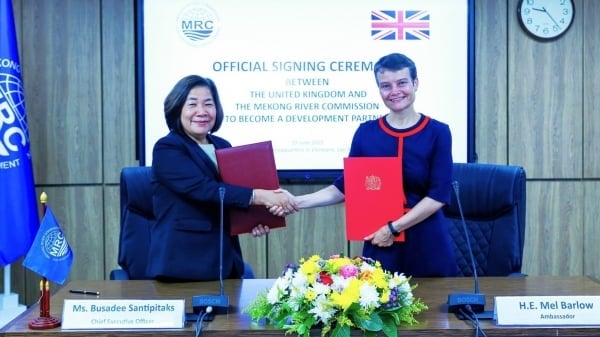
(VAN) On June 19, the United Kingdom officially became a Development Partner of the Mekong River Commission.

(VAN) Biodiversity is being threatened by traditional remedies made from wildlife. Traditional medicine and humans must change to live in harmony with nature.

(VAN) Agrifood investment and finance solutions for people and the planet.

(VAN) Microplastic contamination has become pervasive in seafood, posing unprecedented challenges for food safety and marine ecosystems.
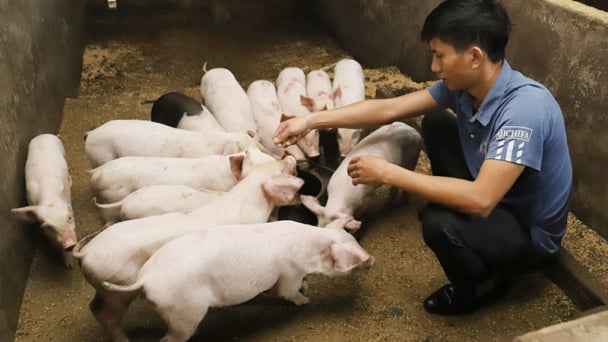
(VAN) Proactively using vaccines, combined with transport control and enhanced surveillance, is the only viable path toward biosecure and sustainable livestock production in Vietnam.